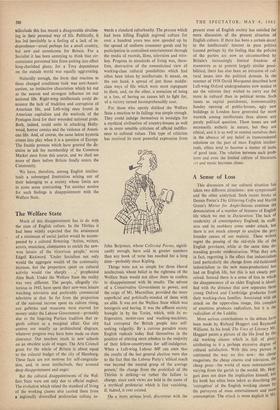The Welfare State
Much of this disappointment has to do with the state of English culture. In the Thirties it had been widely expected that the attainment of a minimum of social justice would be accom- panied by a cultural flowering. 'Artists, writers, actors, musicians, cinemamen to enrich the new- won leisure of the victorious people,' wrote Edgell Rickword. 'Under Socialism not only would the aggregate wealth of the community increase, but the proportion spent on cultural activity would rise sharply . . .,' prophesied Alan Bush. Under the Welfare State the reality was very different. The people, allegedly vic- torious in 1945, have spent their new-won leisure watching television and preferably commercial television at that. So far from the proportion of the national income spent on culture rising, our galleries and museums were starved for money under the Labour Government—probably due to the lingering Puritan tradition that re- gards culture as a marginal affair. Our city centres are usually an architectural disgrace, whatever progress may have been made on slum clearance. Our teachers teach in new schools on an obsolete scale of wages. The Arts Council grant for the whole of Britain is about equal to the cultural budget of the city of Hamburg. These facts are not motives for self-congraula- tion, and, in most intellectuals, they aroused deep disappointment and anger.
But the cultural disappointments of the Wel- fare State were not only due to official neglect. The evolution which raised the standard of living of the working classes also carried them from a regionally diversified proletarian culture to- wards a standard suburbanity. The process which had been killing English regional culture for over a hundred years was now speeded up by the spread of uniform consumer goods and by participation in centralised entertainment through the media of records, films, television and wire- less. Progress in standards of living was, there- fore, destructive of the romanticised view of working-class cultural possibilities which had often been taken by intellectuals. It meant, on the one hand, a spread of just those middle- class ways of life which were most repugnant to them, and, on the other, a sensation of being at a loss, of having no causes left to fight for, of a victory turned incomprehensibly sour.
For those who openly disliked the Welfare State a reaction to its failings was simple enough. They could indulge themselves in nostalgia for a mythical civilisation of country-houses as well as in more sensible criticism of official indiffer- ence to cultural values. This type of criticism has received its most powerful expression from John Betjeman, whose Collected Poems, signifi- cantly enough, have sold in greater numbers than any book of verse has reached for a long time—probably since Kipling.
Things were not so simple for those liberal intellectuals whose belief in the rightness of the Welfare State would not allow them to confess to disappointment with its results. The advent of a Conservative Government to power, and the reign of Mr. Macmillan, provided the more superficial and politically-minded of them with an alibi. It was not the Welfare State which was bourgeois and boring. It was the affluent society brought in by the Tories, which, with its re- frigerators, motor-cars and washing-machines, had corrupted the British people into self- seeking vulgarity. By a curious paradox many English radicals today find themselves in the position of uttering stern rebukes to the majority of their fellow-countrymen for self-indulgence. When a Left-wing Labour MP can state that the results of the last general election were due to the fact that the Labour Party's 'ethical reach was beyond the mental grasp of the average person,' the change from the proletkult of the Thirties is striking—or rather the failure to change, since such views arc held in the name of a mythical proletariat which is fast vanishing, if, indeed, it ever existed.
On a more serious level, discontent with the present state of English society has entailed far more discussion of the present situation of English culture. If there has been a certain decay in the intellectuals' interest in pure politics (caused perhaps by the feeling that the policies of the parties are now so circumscribed by Britain's increasingly limited freedom of manoeuvre as to present largely similar possi- bilities), there has also been an intrusion of cul- tural issues into the political domain. In the summer of 1958 David Marquand described how Left-wing Oxford undergraduates now tended to see the reforms they wished to carry out far more in cultural than in political terms. Such issues as capital punishment, homosexuality, Sunday opening of public-houses, ugly new buildings in London have generated far more warmth among intellectuals than almost any purely political question. These issues are not necessarily :esthetic in nature, but they are ethical, and it is as well to remind ourselves that, in the absence of any belief in transcendental solutions on the part of most English intellec- tuals, ethics tend to become a matter of taste, of good taste. The relation between such prob- lems and even the limited culture of literature, art and music becomes closer.






































 Previous page
Previous page